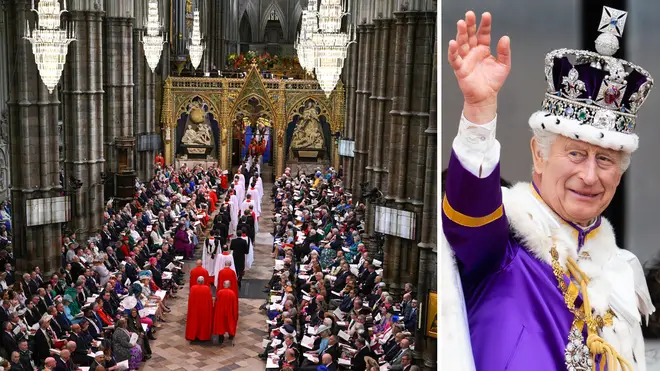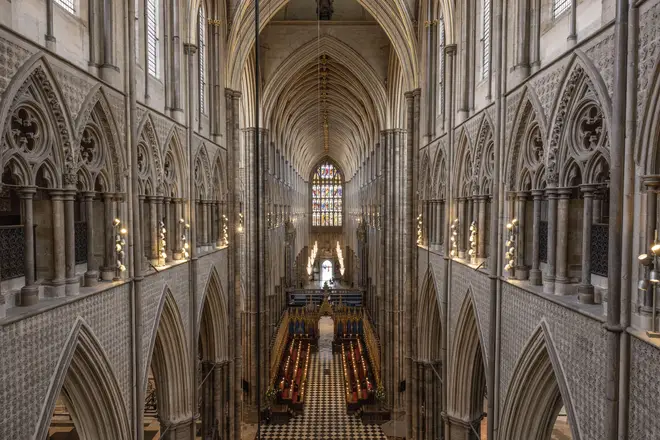On Air Now
Calm Classics with Karthi Gnanasegaram 10pm - 1am
7 May 2023, 12:21 | Updated: 8 May 2023, 14:13

Roderick Williams sings at the Westminster Abbey coronation
King Charles’ coronation was a magnificent celebration of choral, orchestral and liturgical music-making. Here are the details of every piece of music performed during the service at Westminster Abbey.
The King’s coronation, held at Westminster Abbey on 6 May, was a celebration of British music old and new.
Among anthems by Handel, Parry and Byrd, featured a new anthem by Andrew Lloyd Webber, and several other works personally commissioned by King Charles, with solo performances from Sir Bryn Terfel, Pretty Yende and Roderick Williams.
In a historic first, the complete coronation was recorded and released as an album on the day of the ceremony (you can hear several pieces played throughout the day today on Classic FM).
Here is every piece of music that was performed in the Abbey – before, during and after the service.
Read more: Who is performing at the Coronation Concert and when does it start?

Six of the King’s new commissions were composed for orchestra and were performed in Westminster Abbey before the service, prior to the arrival of the King and Queen, alongside music by Bach, Vaughan Williams and more.
Before the service, the Monteverdi Choir and English Baroque Soloists performed:
Westminster Abbey’s assistant organist, Matthew Jorysz, played:
The Coronation Orchestra – made up of players from the Philharmonia, Royal Philharmonic, Royal Opera House Orchestras and more, conducted by Sir Antonio Pappano and led by Vasko Vassilev – played the first of the King’s commissions, a short overture by Judith Weir, the Master of the King’s Music:
The Coronation Orchestra then played:
Read more: What music featured at His Majesty the King’s coronation at Westminster Abbey?

Bryn Terfel sings at Westminster Abbey coronation
The orchestra was joined by Royal harpist Alis Huws for a new arrangement of a Welsh folk song set by Sir Karl Jenkins, commissioned by the then Prince of Wales over two decades ago:
South African soprano Pretty Yende stepped forward to sing a new commission:
The Coronation Orchestra performed:
Based on one of His Majesty’s favourite hymns, this next commission came from a trio of composers, Hess, Williams and Thompson. Their individual musical responses to the Irish hymn ‘Be Thou my Vision’, including a musical cryptogram of His Majesty’s name, were woven together into a single work:
Read more: Soprano sings King’s favourite hymn ‘Be Thou my Vision’ in historic chapel

William Byrd ‘O Lord, Make Thy Servant Charles’, sung by The Sixteen
Next followed an organ commission played by the assistant organist, ‘Voices of the World’, combining traditional melodies from the Commonwealth.
The Coronation Orchestra played film composer Patrick Doyle’s ceremonial march, filled with Celtic influence and plenty of pageantry, as the final pre-service commission before the King and Queen’s procession into the Abbey.
The Coronation Orchestra played:
Sub-organist Peter Holder played:
After the music, the faith leaders, representatives of the Commonwealth realms and ecumenical leaders were invited to process into the Abbey. The choir followed, followed by the King and Queen.

King Charles Arrives At Westminster Abbey For Coronation
Here are all the pieces of music performed by the coronation choir during the service.
The coronation service choir, made up of voices from the Choir of Westminster Abbey, The Choir of His Majesty’s Chapel Royal, St James’s Palace, Truro Cathedral’s girl choristers, Methodist College, Belfast, and the Monteverdi Choir, conducted by Andrew Nethsingha, performed ‘I Was Glad’, containing the cry ‘Vivat Rex!’ (Long Live the King!) which was proclaimed by scholars from Westminster School:
Paul Mealor’s ‘Kyrie Eleison’, the first Welsh language performance at a coronation, followed, sung by the choir and bass-baritone Sir Bryn Terfel:
The choir sang two Byrd anthems:
A setting of Psalm 47 beginning ‘Alleluia, Alleluia!’ commissioned from Classic FM’s composer in residence Debbie Wiseman, was heard next by the coronation choir, followed by a second iteration performed by the Ascension Choir.
Read more: King Charles ‘very much wanted a gospel choir’ at coronation, says Debbie Wiseman

After the Archbishop’s sermon, the choir performed an arrangement of a Christian hymn incorporating the traditional languages of the four nations of the United Kingdom:
The choir sang the anthem, a text which has always been a part of coronations in England, but most famously since it was set to music by Handel for the Coronation of George II:
The Byzantine Chant Ensemble sang:
After the King was crowned, the Coronation Brass Ensemble played:
We then heard the choir sing a setting of Psalm 61 verses by Thomas Weelkes:
The choir, together with baritone Roderick Williams, sang:

The King And Queen Consort Walk Through Westminster Abbey
After the Queen was enthroned, the choir sang Andrew Lloyd Webber’s coronation anthem:
All stood to sing the hymn:
Read more: What are the lyrics to ‘Christ is Made the Sure Foundation’?
The choir sang a new ‘Sanctus’ by British composer Roxanna Panufnik, one of the King’s 12 commissions for the coronation:
After The Lord’s Prayer, we heard a new ‘Agnus Dei’ set by British-American composer Tarik O’Regan:

King Charles III tried out cello and conducting on 1988 Australia tour
All were invited to stand, to sing a stirring hymn:
Read more: What are the lyrics to ‘Praise, my soul, the King of heaven’?
The choir sang the Anthem, originally composed for the coronation of George III in 1761:
More music followed from the choir, with a ‘Te Deum’ from William Walton, originally composed for the late Queen Elizabeth II’s coronation.
The congregation then joined in singing the national anthem:
Read more: What are the lyrics to Britain’s national anthem and who composed it?

‘God Save the King’, sung by soprano Alexandra Stevenson
During the King and Queen’s procession out of the Abbey, the orchestra played:
The sub-organist played:
The Coronation Liturgy for King Charles III was commissioned by Justin Welby, Archbishop of Canterbury.